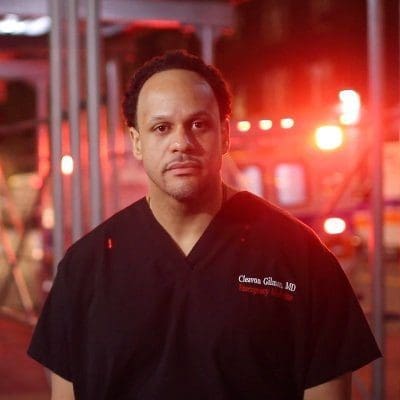
Every day after work, he removes his scrubs and his sneakers. He leaves them outside, gets cleaned up, and greets his family, a source of respite in a world otherwise occupied by the unrelenting shifts treating patients suffering from COVID-19.
Cleavon Gilman, MD, is an emergency department physician in New York City, the city that has been hit the hardest in the U.S. by the coronavirus pandemic. “This virus is very deadly,” Gilman said when asked about his experiences on the front lines, “It’s indiscriminate. We’ve lost 16,000 people in New York.”
He added more quietly, “We’ve lost three personal colleagues in the past two weeks.” Just this week,
Gilman’s colleague, Dr. Lorna M. Breen, a top ER physician treating patients with coronavirus, died by suicide.
Gilman, who is an Iraq war veteran and person who stutters, is no stranger to weathering adversity.
“Just growing up with a speech difference is hard. For a majority of my life, I tried to correct it. We played games and tried to circumvent certain words to improve my fluency. Word substitution was a very big thing I used to do,” said Gilman. “I would read the dictionary to learn a lot of words to increase my flowing.”
Despite the support of his mother and determination to speak more fluently, Gilman remembers school as a challenge. On one day during third grade, he walked in to his classroom, and a message on the chalkboard caught his eye: “C-C-C-C-CLEAVON.” From then on, he shut down and did not participate in class. In high school, Gilman’s quiet nature was perceived as such a problem to administrators that he received in-school suspensions. “I was labeled a problem child because I wouldn’t participate in a traditional way,” he explained.
Gilman eventually dropped out of high school as a result of his struggles and did not return until the following year. Ultimately he graduated, only to be confronted with another challenge faced by people who stutter: interviews.
“It’s hard when you go on interviews as someone who stutters. If you are just having a bad day, there goes your chance,” Gilman said. “You can be the most talented person, but there are a lot of people who view stuttering as something associated with a person’s intellect.”
Gilman eventually found his chance with the military, successfully completing boot camp and serving in the Iraq War. His time in Iraq was challenging, he said, but invaluable as a shared experience with his fellow troops. His community lifted him up and served as a trusted group he could listen to and learn from.
His support system looks different now. He finds strength from his family, isolated at home, and his colleagues, working long hours and in stressful situations. “We see trauma in the hospital, and we have to tell families that their loved one is not going to survive or that their loved one has died,” Gilman said. “You take that trauma, add to it that you can’t hang out as a community anymore.”

It’s a situation he has described as being more challenging that serving in Iraq.
Despite the demands the past weeks have presented, Gilman says he has no hesitation about his career in medicine. “I wasn’t supposed to be anything in life. Anything I’ve done, I’m not supposed to have done.”
As a child, Gilman recalls reading a book about a physician with a speech difference. It was the first clear realization he had that he could have a career as a doctor. He still has the book today. “Look at the job that I have – I have to command the room,” Gilman said of how important communication is. “In a critical situation, I have to talk. I need you on the airway, I need you to administer this drug.”
“I hope to say to people who stutter that you can be anything you want to be in the world,” he continued. “First, you have to imagine and visualize it, and then you have to actually go through a plan and realize it. For me, getting from point A to point B had many ups and downs, but it’s all a journey.”
“Stuttering has given me a lot of empathy for people of all walks of life,” he adds. “I know everyone in the hospital, and everyone knows me. I talk to everyone.”
He knows that stuttering can put people who stutter at a disadvantage, but he encourages those interested in medicine or any other field to keep pursuing their dreams. “You’re going to have your bad days. You’re going to feel like I can’t do this anymore, and you’re going to have blocks on every word. Have your outlet.”
Outside of the hospital and life with his fiancée, Maribel, Dr. Gilman’s outlet is music. Ever since he tried rhyming and hip hop on his own at age 12, he has found music to be an outlet that has allowed him to express himself, unhindered and with immense joy.
Dr. Gilman has shared experiences combating the COVID-19 crisis in a number of national media outlets over the past few weeks. Read and watch more from Dr. Gilman at https://cleavonmd.com/ or follow him on Twitter.
